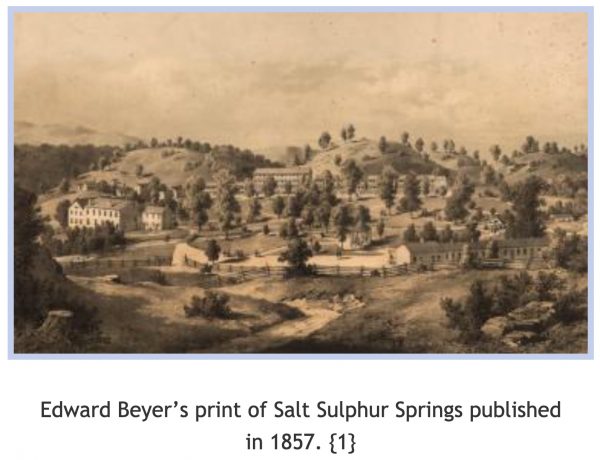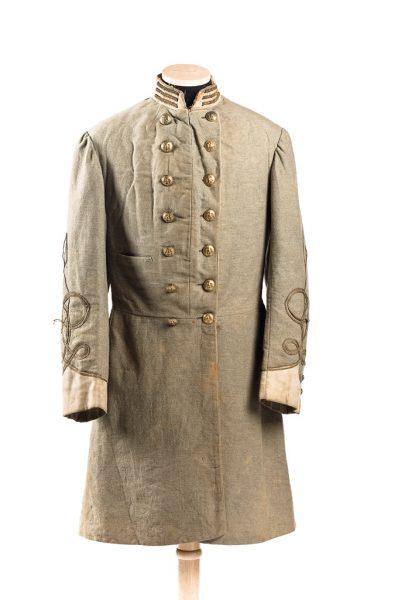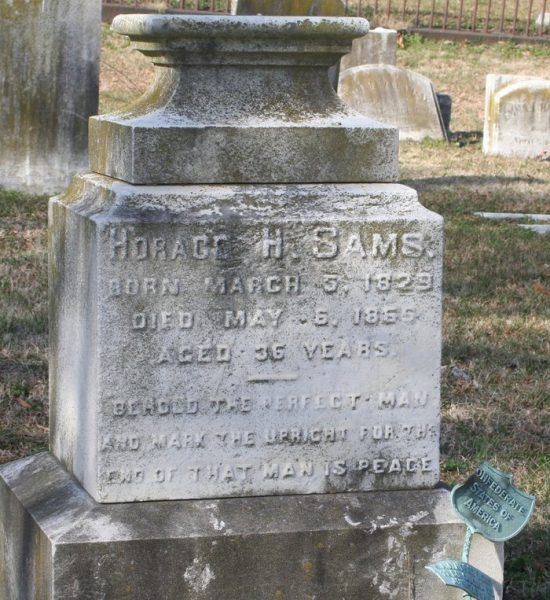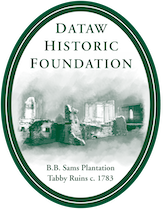Image above of Major Horace H. Sams, CSA belongs to Ting (Sams) Colquhoun. Used by permission.
Horace Hann Sams (1829-1865) is one of the four Beaufort men I wrote about earlier who died in the Civil War. Today I dig deeper into Major HH Sams life and legacy. It becomes clear from contemporary accounts about him what drove this southern soldier in our American Civil War. Those he left behind were deeply affected by their loss. To paraphrase novelist Mitch Albom, his death ended a life, not a relationship. His older brother Rev. James Julius Sams, carries his sorrow into the memoir he wrote 40 years later.
Context of the Times
HH Sams was a southerner born 30 years before the Civil War. He was a planter born into a planter’s family with the wealth to educate their children, but the curse was to have that wealth built on the backs of the enslaved. Even after several years of writing about the Sams of South Carolina and admiring all that they accomplished, I struggle to look back on history and understand how they could have fought for a cause that seems so unjust.
From a 2022 perspective, it is hard to appreciate the U.S. in 1830. This is why Professor Larry Rowland’s three-volume history of Beaufort County is such a treasure. In Volume 1, chapter 21, he describes the mind of antebellum Beaufort through the lives of five prominent citizens. As the 1850s approached, the drumbeat of the anti-slavery movement grew. And it wasn’t an orchestra of ideas for dealing with slavery, something to be discussed on a national level and peacefully resolved. Instead, it was a constant pounding upon every southern citizen by the northern abolitionists who did not want to listen but to preach; they did not like to discuss but demand.
Inevitably, the southern citizens heard attacks on every aspect of the Old South. They felt they were being forced to defend all of the Old South institutions that had nurtured, educated, and supported them.
With this perspective, I looked at what we know about HH Sams. He was born at a point in time, just 30 years before the climactic destruction of the antebellum south began when defending his family and way of life was not a question but a duty. Two contemporary accounts about HH Sams provide insights into the mind of a southern soldier in our American Civil War and those left to mourn him.
From a Child to a Father
Horace Hann Sams was the youngest son of Dr. Berners Barnwell Sams (1787 – 1855) and his first wife, Elizabeth Hann Fripp (1795 – 1831). In our DHF records, he is the son we know the most about for several reasons. First, we have three first-person accounts of his life. Rev James Julius Sams (1826 – 1918) was three years older than Horace. You get a sense of how close these two were from the circa 1905 memoir of Julius‘. Nearly all his youthful adventures on Datha and Oak Islands included mention of his brother Horace. This memoir was written at the request of Conway Whittle Sams, Horace’s only son and therefore Julius’s nephew, in about 1905. We also have the diary of Cloe Whittle, Horace’s sister-in-law. She documents his marriage to her sister Grace and his death.
Rev Julius had very fond memories of Datha.
Datha was to us a kind of terrestrial Paradise
As the brothers grew beyond adolescence, they took very different paths. Julius attended Protestant Episcopal Seminary near Alexandria, VA, and became a minister, while Horace graduated from South Carolina College in 1850 with a law degree. However, he never practiced law but instead was a teacher in Beaufort. He likely even taught some of his younger brothers and sisters during the summer.
And then there’s this unique development.
I had never heard of Salt Sulphur Springs, Virginia (today West Virginia) until Horace H. Sams’ son Conway mentioned it in his unpublished Sams-Whittle family history [CW Sams]. The Springs was a summer ‘get-away’ destination for the Sams.

“The 19th-century clientele who enjoyed the facilities came to take the “cure,” as the spring waters were commonly believed to possess considerable medicinal benefits. Many guests occupied their leisure time on the grounds by playing lawn tennis, croquet, or riding horses. By the 1830s, the resort was equipped to handle, and frequently served, upwards of a thousand or more guests (1439 in 1838).”
NRHP Application for Salt Sulphur Springs, 1974
It was a destination for the Whittles of Norfolk, VA, and the Sams of Beaufort, SC. Both Rev J. Julius Sams and Horace H. Sams met their wives at the Springs. Julius married Mary ‘May’ Eliza Whittle (1830 – 1902) in 1858.
Two years later, Horace married May’s sister, Grace ‘Gay’ Latimer Whittle (1831 – 1897).
He (Horace) addressed her (Gay) in the parlor of the old Mills House in Charleston, South Carolina, where she and her father were there on a visit to her sister May, who had already married Uncle Julius.
Conway Whittle Sams
Horace and Gay were married in her hometown of Norfolk, VA. Daughter Francis ‘Fannie’ Fortescue Sams was born first, in July 1861. Son Conway Whittle Sams came along in the summer of 1864.
Horace was at his daughter’s birth, then went off to war serving with the 11th Regiment, South Carolina Infantry (9th Volunteers) with men from Beaufort, Clarendon, and Colleton Counties. Several Sams brothers and cousins served together in this unit throughout the Civil War. But unfortunately, the story of their lives turns tragic over the next few years.
The Civil War – a Will is Recorded
At the outbreak of hostilities, H.H. Sams was a planter and owned the Datha Inlet plantation, which he and brother Julius had inherited from their father B.B. Sams in 1855. By then, Rev Julius was already off serving in the parish of St. John, Summerville, SC.
Often, young men who were old enough to have property would record a will before going off to war.
Horace H. Sams created two documents in addition to his will. The will is dated just a few weeks after the Battle of Port Royal and the planters’ evacuation of Beaufort. However, two months before, on 23 Sep 1861, he created “…an inventory and appraisement of the negro slaves owned and possessed by Horace Hann Sams, of the Town of Beaufort and District and State aforesaid, planter, on his plantation on the Island of Datha.” It lists his 32 slaves by name, age, and value.
The Will
State of South Carolina, Beaufort District,18th Nov. 1861
In the name of God, Amen: I , Horace H. Sams, of the town of Beaufort, of the District and State afore-said, planter, knowing the uncertainty of life, and the certainty of death; but not knowing the time thereof; do hereby make and declare this to be my last will and Testament, making null and void all former wills by me at any time made: I commit my soul to the hands of my God to gave it:
To my wife, Grace L. Sams, I give, devise and bequeath, all my property of which I die possessed, of whatsoever kind, both real and personal, to have and to hold the same for her own use, and during the term of her natural life; and after the death of my wife, I give, devise and bequeath, all of my property both real and personal, o f whatsoever kind, and wheresoever found, to my daughter, Fannie Fortescue Sams.
My real estate thus disposed of consists of one lot in the town of Beaufort, District and State aforesaid, and of one plantation on the Island of Datha, and one-third of an undivided Tract of Pine Barren of 100 acres, and a life-interest in a Tract of Fine Barren of 30 acres on Ladies Island, in the District and State aforesaid; and also a “right of way,” through the plantation of Dr. R. R. Sams, and through the plantation of B. F. Capers, from the town of Beaufort to Datha. The personal property bequeathed in this will consists of negro slaves, horses, mules, boats, carts, etc., etc., crockery, etc.
I desire that my gold watch and gold studs should be given to my Daughter, Fannie Fortescue Sams, together with such moneys as are now due to me, so soon as she can use the same.
I appoint my wife, Grace L. Sams, to be the executrix of my last will and Testament.
Signed, sealed and delivered, in the presence of us, the witnesses of this will & Testament.
Horace H. Sams, (L.S.)
Charles C. Sams
J. Julius Sams
M. M. Sams
(Bill Riski: witnesses are half-brother Charles Clement Sams (1837 – 1865), brother James Julius Sams (1826 – 1918), and brother Melvin Melius Sams (1815 – 1900). C. Clement Sams also served in the Confederate States of America military and died just one week after Horace.)
One year later, 26 Sep 1862, he created another list. “The following is an inventory, an appraisement of all the property on the Datha Plantation at the time that it was taken possession of by the Federal forces. The original of this document under the seal of the Confederate States of America, and signed by J. P. Benjamin, the Secretary of State, is in our possession.”
Excluding his slaves, he shows his real property was worth $23,732, or about $740,000 today.
From this record, it appears Datha Island was confiscated from the Sams in mid-1862. It would be over 120 years before a Sams descendant returned to live on the island.
His Death
Major Horace H. Sams’s only son Conway Whittle Sams compiled the facts of his father’s death from others. Conway was only ten months old when his father died, but these facts are probably accurate. Dr. R. Randolph Sams, Horace’s brother, was at his side when his brother Horace died so could give the family an eye-witness account.
“He died of typhoid fever on May 6th, 1865, at Greensboro, North Carolina, in the Methodist Church, then used as a hospital, now, (1901), turned into an Academy of Music. He was in his 36th year. He was first buried in the grounds of that church, but afterwards his body was brought to Norfolk, and reinterred in Cedar Grove Cemetery. He had been dead one or two weeks before our mother knew that he was even sick, and his death was a great blow to her.”
Grace ‘Gay’ Sams, took Conway and his older sister Fannie back home to Norfolk, VA. They spent the rest of their lives there with Conway’s widowed grandfather Conway Whittle, Jr. (1800 – 1881). Grace died at the age of 66 in 1897. Daughter Fannie lived a long life in Norfolk, VA and never married. She died at the age of 75 in 1936. Her brother Conway Whittle Sams married and I don’t believe had children; though our records are not complete here. He died in 1935.

Cloe Whittle
In addition to the memories of H.H. Sams penned by his brother James Julius Sams and his son Conway Whittle Sams, while researching this story, I came across another first-person account of the Sams and Whittle families, contemporary to their times. It is the diary of Cloe Tyler Whittle, Horace’s sister-in-law. She began her diary in 1861 and continued it for over 60 years!
When the Civil War began, she was 17. There were three women in the family, May (Mrs. J. Julius Sams), Gay (Mrs. Horace H. Sams), and Cloe. Given what a writer Cloe was, it’s not surprising she and her sisters corresponded a fair amount during the war. Cloe was a very Southern, religious, and educated young lady, and her diary reflects this. The portion of her diary I’ve linked below covers the Civil War years.
I was shocked to see how often she spoke of President Jefferson Davis. It appears Cloe was good friends with President Davis’s niece. Cloe even had the opportunity to visit with him while in prison after the war and write about it in this diary!
When the Civil War ended in April 1865, it was a troubled transition back to peace. Horace died in May. His wife Gay is not with him and does not even know of his illness. Fortunately, his brother Dr. R Randolph Sams is with him in Greensboro, N.C., at his death. His wife and the rest of the family find out a few weeks later. Cloe entered the sad news in her diary on May 22, 1865. More details of Horace’s last days make it back to the family as the weeks go by.
July 1, 1865 Cloe Whittle pens this poignant passage in her diary,
Gay says Horace told Randolph that except for his wife & children, he had no wish to live, that he thought a thousand deaths were better than subjugation. A very natural feeling for an honorable man – a Southerner & a Christian.
I can’t help but wonder if those who served in the war between the states, indeed most of the Sams planters, also felt this way.
Epilogue
The original picture of Major H.H. Sams in the possession of Ting (Sams) Colquhoun of Beaufort, which you can see in the Four Young Men article has very faint writing in the lower right corner. I spent some time recently using software to tease out what the writing says. Much to my surprise I discovered this,
Affectionately
H.H. Sams
It appears to me that Horace Hann Sams inscribed this photo to his wife, Grace (Whittle) Sams at some point early in the Civil War. We are fortunate that the picture has survived.

Sources
Davies, Emily R – What Sorrows and What Joys: The Civil War Diaries of Cloe Tyler Whittle, 1861-1866, Thesis at College of William & Mary – Arts & Sciences, 1993
Sams, Conway Whittle – History of the Sams and Whittle Families, unpublished, circa 1925
NRHP Application for Salt Sulphur Springs, 1974
#52 Sams


